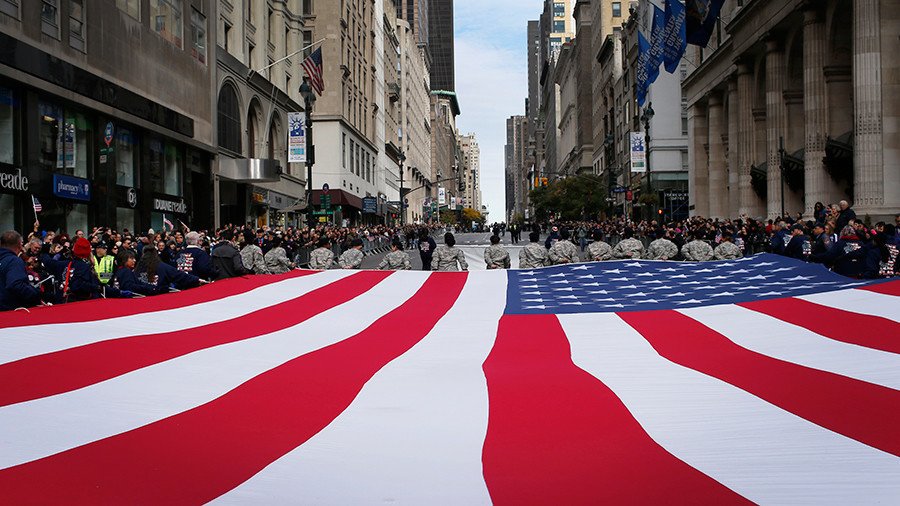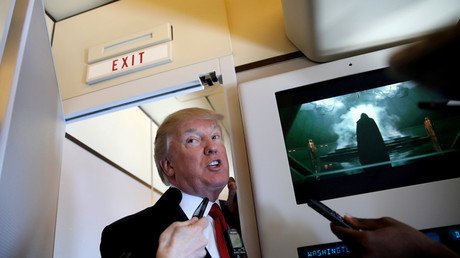‘US confronted with the loss of its dominant world position’

America is seeking to employ military power to offset the loss of its dominant world position, and with that comes authoritarianism, attacks on democratic rights and efforts at censorship, said prominent socialist David North.
‘On Contact’ host Chris Hedges discussed the capitalist crisis in the US with David North, the national chairman of the Socialist Equality Party (SEP) in the United States, formally the Workers League. North is the chairman of the International Editorial Board of the World Socialist Web Site (WSWS), now blacklisted by Google, Facebook and Twitter. He is also the author of several books and articles on the history of the Socialist Movement.
RT: Let's talk about the historical moment we're in now and then look back and maybe compare it. But where are we right now?
David North: I think we're in the midst of what is the greatest political, economic, social crisis of the world capitalist system, certainly, since the 1930s, since the end of the Second World War. This is a crisis of global dimensions, this is of course a crisis which dominates every element of American official politics, American policy. I think the response that we're seeing in the astonishing changes in the state of the government, the decay of political life, the astonishingly low level of political and intellectual discourse, in a certain sense an expression of the bewilderment of the ruling elite to what it's going through. I mean in a certain sense you can say the United States is now confronted with the implications of the loss of its dominant world position. And it is seeking to employ military power to offset that. And with that comes authoritarianism, attacks on democratic rights, efforts at censorship…
But it's not just an American situation: if we look at the world situation, France is in a permanent state of emergency. For the first time since the end of the Second World War, something which is not being commented on in the international press, neo-fascists will have a substantial presence in the German Bundestag.
RT: And they've taken over countries like Hungary and Poland already, and Ukraine…
DN: Yes, this is a growth of an extreme. So we consider looking back somewhat further to the 25 years since the dissolution of the Soviet Union, which was proclaimed to be the end of history, that we were now going to see what capitalism could accomplish with the triumph of liberal democracy, Francis Fukuyama speaking at ‘The End of History’ …it turns out to be have been a completely false assessment of the situation. All the unanswered problems of the 20th century: the basic problem of the nation state system, the reactionary character of private ownership of the means of production, corporate power, all of these issues which led to the First and Second World Wars are with us again, and the fascism.
RT: The difference if we go back to the ‘30s or we go back to the kind of height of radical movements on the eve of World War I is that with the deindustrialization, and we essentially have obliterated unions, we had a diverse press, anarchist publications, the masses. All of that's gone. So you have a loss of organization as well as a loss of consciousness, which disempowers us in the face of a rising authoritarianism, doesn't it?
DN: I think it’s important to look at these processes historically. Yes, you could look at these and say ‘we don't have this, we don't have that.’ But I think that generally speaking, there is a complex relationship between consciousness and historical processes. In one sense, many of the problems we face are inherited from the unanswered problems of the 20th century: certainly, the impact of Stalinism on political consciousness, the betrayal of revolutions. In the United States – the failure of the labor movement to break with the Democratic Party, its subordination of the working class to the Democrat Party…
RT: Those unions like the Wobblies or the old CIO (Congress of Industrial Organizations) that wouldn't essentially surrender, were destroyed…
DN: It’s a bit more complicated. Of course, the 1930s due to the influence of socialists and communists, there was a huge growth in unionism at that time. But the fatal bargain which the trade union movement made with the Democratic Party led in the long term to disaster. The American labor movement never broke with a two-party system and that underlies all the… many of the problems which of course are confronted today. But if you put it into somewhat broader context, the basic problem is that all of these old organizations of the labor movement based themselves on a national program, on a national policy which was viable to the extent that there existed the possibility of achieving gains on the basis of national reformism. That was true in the ‘50s, and the ‘60s, into the ‘70s. But the situation has dramatically changed. We live in a global economy, highly interconnected, a globalized process of production and financial system – the ruling classes have an international policy in that sense. They organize themselves on an international scale to the extent that the labor movement has remained organized on a national basis, it has been completely incapable of answering this. And so therefore they fall behind various national protectionist programs. Sections of the trade unions support, really support Trump. Our view is that the there's going to be a reemergence, as there always is, the historical process is difficult but it does tend to work itself through. There's going to be a revival of an internationalist outlook, a socialist outlook. I think we're already seeing signs of that. Not just in this country, but internationally…
















